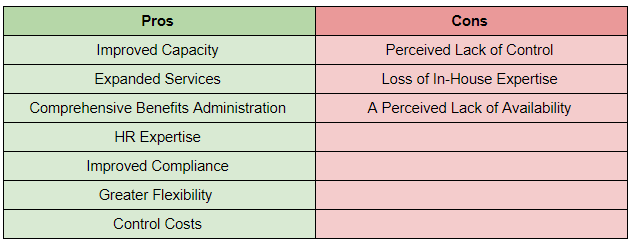Human resources outsourcing has emerged as one of the most popular professional services for companies looking to outsource. This is because companies seeking to improve workflows, reduce overhead costs, and focus on strategic initiatives are turning to HR outsourcing partners to achieve greater efficiency than if all HR functions were being managed internally. Still, it can be difficult for companies to determine whether outsourcing such an important business function is right for them. Let’s explore outsourcing human resources pros and cons to help you understand if it’s the right choice.

HR Outsourcing Options
For companies looking to outsource HR functions, there are multiple types of outsourcing available. The primary options include an HRO, PEO, or an ASO. The right option depends on the number of employees a company has and the type of support they require. For example, an HRO offers customized HR solutions based on a company’s strategic needs, while an ASO may offer a limited, standardized range of services. All of these options also provide compliance with HR regulations to ensure that HR practices are following the law.
The Cons of HR Outsourcing
Outsourcing human resources pros and cons may not look the same for everyone. Still, the list of cons is relatively short and maybe instead be considered misconceptions about the HR outsourcing process.
Perceived Lack of Control:By choosing to outsource HR functions, some companies may worry about losing control over their employees. However, this is actually not the case. When companies find the right partner to manage their HR functions, it is more of an extension of their team. A good HR partner should seek to understand what a company needs and work with them to set goals and identify the right HR services to make it them reality.
Loss of In-House Expertise: When companies outsource their HR functions, that does not mean they should no longer think about HR. Even if the majority of HR functions are being managed by a third party, there still should be someone within the organization that keeps up to date on HR. While the HRO is expected to be the true HR expert, this can ensure alignment between the two entities, all tasks are being handled efficiently and can provide insight into company culture.
PerceivedLack of Availability: It may be easy to think that outsourcing HR to a third-party means that they won’t be as responsiveor available for questions and concerns as an internal HR department. However, the right outsourcing partner will be available whenever needed. When outsourcing to Corban OneSource, with experience working for companies with between 75 and 6,000 employees, help is always just a call away. Corban OneSource provides transparent support and guidance just as an internal HR department would.
The Pros of Outsourcing
In contrast, when comparing outsourcing human resources pros and cons, the list of pros is much longer. These services provide many benefits to companies, which is why they are highly sought after by companies of all sizes.
Improved Capacity: Opting to outsource HR to a third party enables companies to leverage an established team of HR professionals. These teams can easily handle fluctuations in HR services, the number of employees, and other shifts that would be difficult to handle in-house. For an HRO, these capabilities are readily available, which means they don’t need to make hires or find other resources as a company’s HR functions evolve.
Expanded Services: Choosing to outsource HR functions means that a company can often leverage an expanded range of HR services that may be available in-house. From designing employee handbooks to monitoring compliance with HR law and managing payroll, HR outsourcers often provide an array of valuable HR services.
Comprehensive Benefits Administration: HR managers typically spend between 25% and 30% of their timemanaging employee benefits. However, these managers also need to consider protecting the company’s bottom line – balancing benefits administration with other, more strategic tasks. Because of this, outsourcing HR functions can provide companies with a more efficient way to manage benefits administration. An HR outsourcer is often better equipped to negotiate contracts and buy in volume that can help control costs for employers. At the same time, an HR outsourcing partner is often able to offer more comprehensive services to employees than they would be able to on their own.
HR Expertise: Outsourcing HR functions to a third party provides access to valuable HR expertise. Many companies may not have the right HR talent in-house, but hiring that talent full-time can be cost-prohibitive. Especially as a company grows and tasks such as legal compliance, payroll, and benefits administration grow more complex, having access to experienced HR personnel can be a valuable risk mitigation tool.
Improved Compliance: Employment regulations are continually changing. HR outsourcers often have a more complete, in-depth knowledge of employment laws and how they apply to managing HR. Outsourcing HR functions can help companies ensure they maintain compliance with these laws, protecting both themselves and their employees.
Greater Flexibility: As companies have a demand for a higher volume of HR services, it can be difficult or expensive to hire the right staff to meet those needs. Instead, outsourcing HR functions to a third party can ensure all HR needs are met. At the same time, a good outsourcing partner will have the ability to scale their services up or down depending on the number of employees at a given time, whether a company has recently made hires or downsized its staff. This helps organizations control costs and maintain the necessary level of HR services.
Control Costs: HR costs can add up, from hiring HR employees to investing in training and improving retention. Fortunately, working with an HR outsourcer can help keep these costs under control. Instead of hiring specialized HR staff, companies can outsource their HR needs to reduce the cost of hiring, onboarding, and training new staff. At the same time, an HR outsourcer can help to improve retention and reduce turnover, providing a return that can grow a company’s bottom line.
Ultimately, understanding the outsourcing human resources pros and cons can help companies make an educated decision before choosing to outsource. Outsourcing HR can provide numerous benefits that can help companies control costs, manage regulatory compliance, and improve the services they provide to employees. This means that it is more important than ever to find a trusted HR outsourcing partner that can meet commitments, improve efficiencies, and deliver value.
Choosing an HR outsourcer like Corban OneSource can help take the stress out of HR management. With services including payroll processing, benefits administration, and regulatory compliance for companies with 75 to 6,000 employees, Corban OneSource provides dedicated support and ensures that every client can keep pace with the rapidly changing HR landscape. To learn more about our HR outsourcing services, contact us today.


